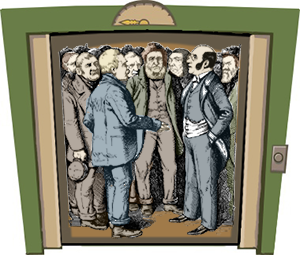
Now, obviously, the odds that you’ll have the opportunity to make an impression on someone in 30 seconds is a long shot. But you never know! Actually, the point of an elevator speech is to force you to think through a single concept about your business, then make the point as concisely as you can.
Developing elevator speeches about your company focuses your thoughts and can reveal direct action steps for you to take. It is much like writing a “mission and vision” statement, only much more useful.
Here are appropriate and useful questions to ask yourself when creating the ideal elevator speech (AKA, marketing message):
1. What makes my asphalt paving and repair business different from the others?
Once you articulate this, you basically have your marketing message. Differentiation is key in attracting new business. You not only have to make your stand, you have to get the difference out into the marketplace. Yours is the business that:
• charges the lowest price
• has the most up-to-date technology
• offers the best quality
• is the fastest
• offers the best guarantee
Define your difference/advantage, then make sure every potential buyer knows what it is. For example, the paving business is ideal for offering jaw-dropping guarantees. Done right, the asphalt product is inherently durable, so paving contractors who stand behind their work with a gilt-edged, rock-solid guarantee are in an excellent position to gain customer trust at a low cost. Annual checkups on your work, for example, give customers a feeling of great confidence, and may just be the thing that gets you their future work over your competitor. It’s also a great way to keep your customers close, and assure they choose you down the road.
2. Why should any particular customer care that I am in the asphalt paving and repair business?
Only you can answer this one. Perhaps you give back to the community. Perhaps it’s about your environmental concerns and approaches to asphalt in the environment. This could be your speed, or your capacity to innovate, jobs you create.
This is like the question TV newsman Roger Mudd posed to Ted Kennedy in 1980, when Kennedy decided to run for president. When Mudd asked Kennedy, simply, “Why do you want to be president?” Kennedy just fell apart. He could only stammer, thus effectively ending his campaign on the starting line.
3. What are the characteristics of my best customer?
This is simple. Study your best, most ideal customer – the one about whom you say, “If I had a hundred more like this, I’d be set.” Now, note the things about that customer that make him ideal – not counting how much money he spends with you. What does that customer have that makes him need and want to buy from you?
This is the first step down the road toward finding the “hundred more” just like that! If you’re a driveway contractor, maybe it’s a certain kind of neighborhood. Once you know the age, size and other characteristics of that great, ideal neighborhood, set out to find others of the same or similar age, size and so on. This leads naturally to:
4. How do I get the attention of others who resemble my best customer?
What newspaper does my ideal customer read? What magazines? Where does my ideal customer shop? Does my ideal customer search the Internet? Yellow pages? Where do I have to be for my ideal customer to see me?
5. What are the top three things my customers want from me?
It’s good to give this one some thought. Put yourself in your customers’ shoes. What would be their ideal experience and result in dealing with you? It might be a good idea to call a couple of your customers or prospective customers, and just flat out ask them.
6. What are three improvements I will make to my business this year?
This type of planning and goal setting pays off in sensible, attainable growth for your business. While it is certainly possible to have extensively detailed plans of how to get from A to B, it all starts with a concise statement of, “Exactly what is Point B?”
7. What is the toughest business problem I have?
You will find it is actually easier to tackle a business problem when you break it down into three words:
• finding good employees
• retaining good employees
• affording equipment upgrades
• improving my bidding
Once you have distilled your greatest challenge into three little words, it does not seem nearly as formidable as when it is just “a big problem.” Define it, then list three things you might try to improve the situation. This is an area where clarity of thought and tackling a problem systematically can make all the difference.
8. What do I do to ensure my best employees will stay with me?
If you have the slightest amount of trouble thinking of the techniques you use to keep your employees happy (beyond handing them a paycheck), consider that a red flag. What is any paving business but a few vehicles and a group of people – and, as you already know, it’s a lot easier to replace a vehicle than it is to replace a Steve or a Dave or a Jeff.
As the boss, it’s important for you know how your employees really feel about working for you and your company. Many bosses think they know, and would be horrified to hear how their people talk about their job to friends and family.
Your business needs its employees to project approval and satisfaction with your company to the world. How often do you hear others moan and groan about their job? How does that reflect on the company they work for?
Are you a micromanager? Do you take employee successes for granted? Do your people feel comfortable coming to you with questions or suggestions? Are your demands reasonable? Is it perfectly clear to them that you care about their safety?
In fact, it would probably be a good idea to make your list, then share it with your employees and ask them if they agree. For many bosses, it’s very easy to think things are dandy when they’re not.
9. What are the biggest risks to my business?
Again, only you know the answers to this one. Try splitting this into two lists, one for internal threats, and another for external pressures.
10. What are three things I could do to further reduce my risks?
This may be as easy as buying more insurance or as difficult as inventing your own, proprietary, extra-durable mix design.
Take a sheet of paper and use these 10 as starter elevator speeches. Imagine your banker or perhaps a news reporter bursting into your office, pointing his finger in your face and asking, “Why should I care that you are in the asphalt paving business?” If you can respond without hesitating, maybe you’ll get a loan, or a big article in the newspaper.
Challenge yourself to come up with two more elevator speeches, not in this list, that are specific to your situation.
When you distill your company messages into concise statements, you’re paving the way to a stronger future for your company. (Pun intended.)




